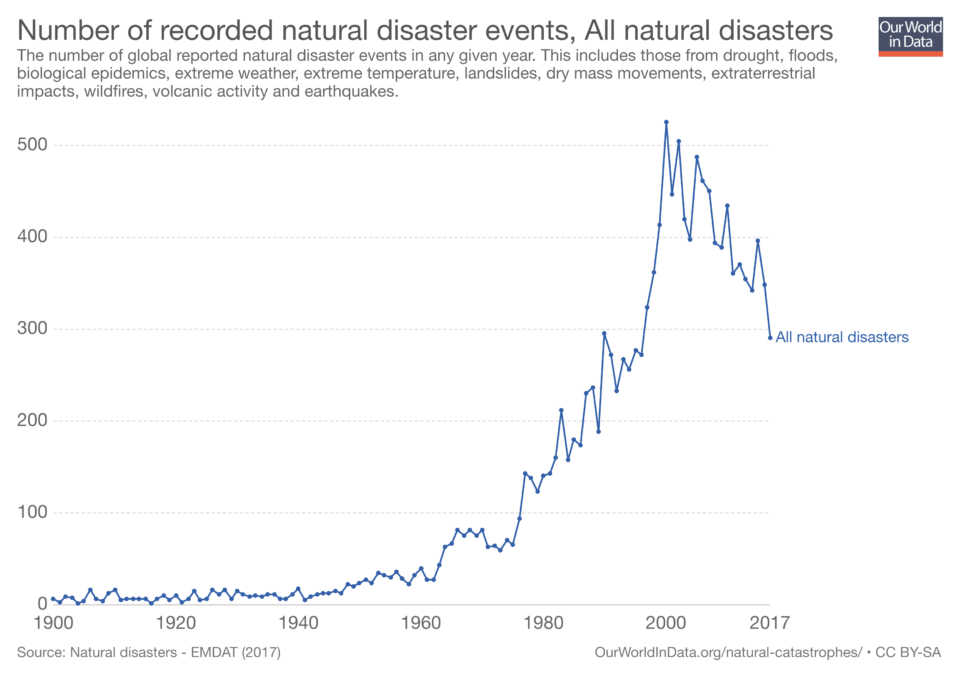Two weeks after Hurricane Florence first hit North Carolina, South Carolina and Virginia, over 25,000 people were in shelters. This storm is just one of the many recent global natural disasters that have left thousands displaced. The number of global natural disasters per year hit an all time high in the year 2000 and has been in decline since then. Unfortunately, this does not mean less people are affected by the disasters that continue to occur.
As the global temperature rises faster than it ever has before, so does the sea level. This correlates with more powerful and impactful disasters that we now have to face.
From the 1993 average, sea level rose 2.6 inches higher in 2014 according to the National Ocean Service, and “continues to rise at a rate of about one-eighth of an inch per year.”
The National Ocean Service’s website also says “higher sea levels mean that deadly and destructive storm surges push farther inland than they once did, which also means more frequent nuisance flooding Disruptive and expensive, nuisance flooding is estimated to be from 300 percent to 900 percent more frequent within U.S. coastal communities than it was just 50 years ago.”
Because of the rise in sea level and the growing population, coastal displacement continues to present a large problem.
In our planet’s history, there has been considerable variance in the Earth’s temperature, but the current models suggest that the Earth will increase in temperature by two to six degrees Celsius in the next one hundred years. According to NASA,“When global warming has happened at various times in the past two million years, it has taken the planet about 5,000 years to warm 5 degrees.”
The rate at which the Earth is warming is causing an array of repercussions that are presenting themselves in a multitude of ways, including natural disasters.
In 2015, there were 150 events worldwide that were considered natural disasters. Asia was affected the most. For example, on April 25, a magnitude 7.8 earthquake killed upwards of 8,800 people in Nepal.

“This was the deadliest disaster on record for the nation of 26 million people,” according to World Vision’s website.
In November of 2015, Chennai, India was flooded with weeks of rain, summing to a loss of over 100,000 acres of cropland and at least 379 deaths.
In the summer of 2017, a monsoon flooded Bangladesh, killing more than 1,200 people. Hurricane Irma hit the Florida Keys a year ago this September, and was referred to as “the most powerful Atlantic storm in a decade.”
In my “Theology and the Environment” class , we discussed how many people in the world are still refusing to accept climate change as reality. There are many rural populations in the United States and around the world that do not have access to a substantial education, and do not understand their impact on the environment, or how easy it is to reduce their impact.
It is very easy to watch the morning news, and conclude that hurricanes and mudslides thousands of miles away, caused by an abstract-feeling concept of climate change, do not affect you. But the displacement of thousands and the tax dollars it takes to clean up the wreckage does. Climate change is still misunderstood in many communities, but as college students experiencing an education far greater than most of the world, we must make people care. It is no longer disputable that our climate is warming, and it is likely that we as humans are causing it.
An outcome of warming is displacing and killing thousands each year, and we need to care. As global minded citizens, we must evaluate the effects and realize that something has to change. The common good is doing what we can while we are safe in Minnesota; to help those who live across countries and oceans. Everyone can find ways to reduce our harm to the environment. Small steps can change the world.
Anna Hoffman can be reached at hoff0001@stthomas.edu

